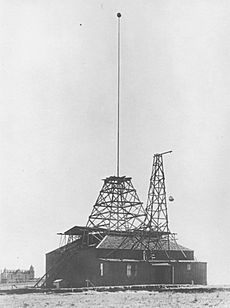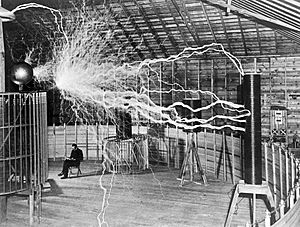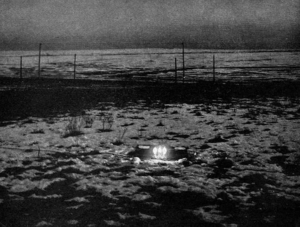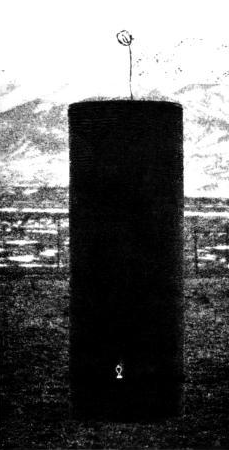Tesla Experimental Station facts for kids
The Tesla Experimental Station was a special laboratory built by the famous inventor Nikola Tesla. He built it in Colorado Springs, Colorado, USA, in 1899. Tesla used this lab to study how to send electricity without wires, using very strong, fast-moving electrical currents. He only used the lab for about a year, until 1900. Sadly, it was taken down in 1904 because Tesla needed to pay off some money he owed.
Contents
Building a Special Lab
In May 1899, Nikola Tesla and his helpers started building the lab. They chose Colorado Springs because it was high up and had lots of space. This was perfect for his experiments with very high voltage electricity. Tesla wanted to learn how electricity could travel through the air. This was part of his big dream to send power without wires.
His lab had the biggest Tesla coil ever made at that time. It was about 15 meters wide! This giant coil was an early version of a machine called the "magnifying transmitter." Tesla planned to use an even bigger one for his Wardenclyffe Tower project later on. When he arrived, he told reporters he wanted to send wireless messages all the way from Pikes Peak to Paris.
Amazing Electrical Experiments
Tesla created artificial lightning in his lab. These electrical sparks were millions of volts strong and could be up to 41 meters long! People walking nearby saw sparks jump between their feet and the ground. Sparks even came from water taps when touched. Light bulbs within 30 meters of the lab glowed, even when they were turned off.
Horses in a nearby stable got shocks through their metal shoes and ran from their stalls. Butterflies flying near the lab were also affected. They swirled in circles with blue halos, like St. Elmo's fire, around their wings.
Power Outage and Strange Signals
Once, during an experiment, Tesla accidentally caused a power station to break down. This led to a power outage for many people. In 1917, Tesla explained that his powerful high-frequency currents had damaged the generators. These generators were about 10 kilometers away! The strong currents caused big sparks inside the machines, ruining their parts.
While working, Tesla also heard unusual signals on his receiver. He thought they might be messages from another planet. He wrote about these signals, saying they sounded like "1... 2... 3...". Reporters found this very exciting and quickly guessed he was hearing signals from Mars. Tesla later said the signals seemed "intelligently controlled" and could come from Mars, Venus, or other planets. Some people think he might have picked up early wireless experiments from Europe.
The Lab's End
Tesla made his last note in his journal in Colorado Springs on January 7, 1900. In 1904, Tesla was sued because he had not paid some bills in Colorado Springs. His lab was taken down that same year. Two years later, everything inside the lab was sold in an auction to help pay off his debts.
Where the Lab Was
The Experimental Station was built on an empty piece of land. It was on the highest point nearby, called Knob Hill. It was located between the Colorado School for the Deaf and Blind and the Union Printers Home. Tesla wrote down all his research from this time in his "Colorado Springs Notes, 1899-1900." Some old papers say the lab was about 60 meters east of the Deaf and Blind School. It was also about 60 meters north of Pikes Peak Avenue. This means it was on top of the hill at E. Kiowa Street and N. Foote Avenue.
See also
 | Bayard Rustin |
 | Jeannette Carter |
 | Jeremiah A. Brown |





